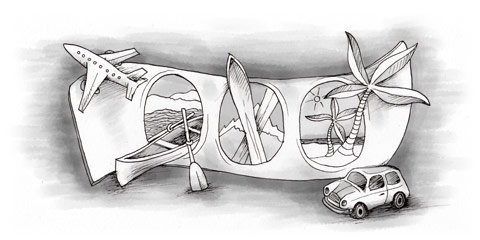Dining in Qatar
Although there has been a large increase in restaurants in Qatar over the last few years they are not very popular with the locals. Men will often conduct business in a restaurant but this is a western practice that has been adopted from necessity and it is more traditional to meet at a coffeehouse. Women generally do not like to eat in restaurants however may use drive-throughs or delivery services.
It is still more common to eat at home with your family. Traditionally both breakfast and the evening meal were only light with the main meal being eaten at midday, however with more people entering the workforce the evening meal is gaining importance. The midday meal on Friday after prayers is generally the main gathering for families except during Ramadan when the Muslim people fast during the day and hold large feasts after dusk. During Ramadan you should not eat, drink or smoke in public even if you are not Muslim. The people of Qatar take pride in their hospitality with food and drink playing a very important role in this. It will not be uncommon for people to offer you food or drinks and refusal may cause offence in some, so it is always best to try a little of everything. The social aspect of dining in Qatar can also be seen in the serving of food which is usually a number of large dishes shared between everyone.
Traditional foods and what to try
Qatar has had strong influences from Iran, Indian and Northern Africa and this has been reflected in the local tastes and delicacies. Being situated on the coast, many of Qatar's traditional foods are seafood based, but for those who are not as keen, they do regularly serve lamb and vegetarian meals. However it should be remembered as the country is largely Muslim, pork is not served. Local delicacies include sour apples, fresh almonds and dates grown from the local area and Iran.
One of Qatar’s most important dishes is Machbous, this is a richly spiced rice stew with seafood, meat or both. It is most commonly served in a large communal dish for everyone to try. As with many meals in Qatar it is often eaten without utensils, instead using pita bread to scoop.
Other dishes you should try while in Qatar are Waraq enab, vine leaves stuffed with lightly spiced rice, Koussa mahshi, stuffed courgettes, Hummus A dip made with tahini (a sesame paste) and chickpeas, and Motabel, a paste made from cooked aubergine, garlic and tahini.
Shawarma is a popular snack, or fast food, in Qatar it includes slow cooked grilled meat from a spit, usually lamb, chicken, beef, or mixed meats, served in a pita bread with assorted vegetables and sauces.
For those of you with a sweet tooth the foods to look out for are mehalabiya, a rose water and pistachio pudding, umm ali, a bread pudding with raisins and nuts, and esh asarayaa a cheesecake topped with cream.
Traditional Drinks
Coffee is a huge part of traditional Qatar life, Arabian coffee is hugely popular for its high quality, it is made from lightly roasted beans mixed with cardamom and served either sweetened with sugar or with local dates. It is served in small measures and drunk regularly, usually it is the first thing offered when visiting someone's home and many business meetings are held at coffeehouse.
On special occasions and celebrations they often drink qahwa helw which is a bright orange sweet coffee infused with cardamom, saffron and sugar.
Alcohol
Although alcohol is not illegal in Qatar it is only available from licensed hotels and restaurants or from one of two stores run by the Qatar Distribution Company and can only be purchased with a permit. There are a number of regulations governing the consumption of alcohol within Qatar:
- It is illegal to bring alcohol into the country and all luggage is scanned on entry,
- Alcohol can not be transported around the country with the exception of taking it from the place of purchase to your own home which should be done immediately and kept out of sight,
- It is an offence to offer alcohol to minors and Muslims who are unable to purchase it themselves,
- It is illegal to sell, donate or give away alcohol and it is illegal to drink or be drunk in public.
Licences can be obtained from the Qatar Distribution Company by sending a letter in English, although Arabic with a stamped English translation may be accepted. The letter must be stamped and signed by an authorised person in your company stating; your position within the company, your basic salary in which the word basic must be used (this is to determine how much you can purchase per month), whether you receive accommodation entitlement or free accommodation, whether the applicant is married, and their religion. A completed application form must be attached and a deposit must be paid. You will also need your passport and residency permit however copies are acceptable.
Although alcohol is available within the country it is very difficult to get hold of and with the laws in place it makes it risky to drink while you are out. This means that it is easier to refrain from consuming alcohol while in Qatar, respect their beliefs and customs, and simply drink lots of coffee instead.

